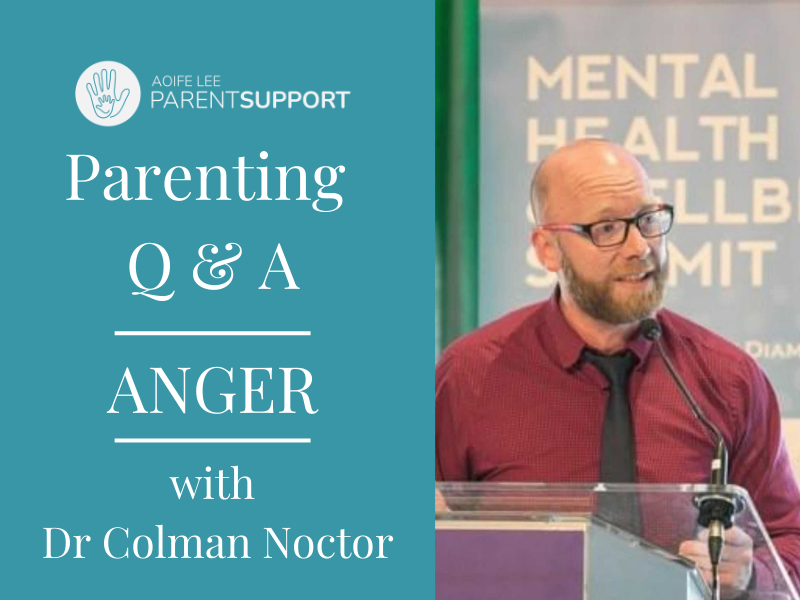Parenting Q & A | How to support your Child’s Anger with Dr. Colman Noctor
The last 12 months have been by far the most challenging and overwhelming for parents and children alike. We have been tested beyond belief, missing family and friends, school, all the normal things as we know them. We have also had to adapt to so much change. Many parents report, with all of that they are too experiencing more tantrums and outbursts from both young and older children, feelings of frustration, anxiety and anger being one of the bigger emotions.
I was delighted to have had the opportunity to chat recently with Dr Colman Noctor who is a Child & Adolescent Psychotherapist and an Assistant Professor in University College Dublin and a father of 3 children. Colman has been working with children and families for over 25 years both in Ireland and abroad. He is a Board Member of Mental Health Ireland and an Honorary Clinical Fellow at RCSI. Colman also specialises in treating eating disorders and childhood anxiety.
We spoke about his views about what children have been going through in recent months. I asked him about what he thought triggered children most, whether anger outbursts are a learned behaviour or an emotional response, what the parent can do when it all unravels for the child as well as how the parent can prepare both the child and them for the next time the emotions spill over.
This is not the first time Colman and I have collaborated , we have shared a stage before, as we presented on parenting at the WWWC Childcare Professional Conference and on a panel for a live discussion on “Life Online - the implications for our mental health” for ‘Walk in My Shoes’, but also more so recently when he invited me on for the parenting chats for his ‘Asking for a Parent’ Podcast - Listen back here.
Colman is also the best-selling author of ‘Cop On’, a parenting book for the technological age. He is also the Resident Psychotherapist and Parenting Advisor on RTE One’s Ray D’Arcy Show, and he writes a weekly column for the Irish Examiner.
Tips to help you support your child’s anger
Many parents report that their children’s behaviours have deteriorated in the past 12 months, in your experience, what do you think the triggers are?
Yes, I would agree, that is what I am seeing too. I think the unnatural nature of Lockdown life is exacerbating children’s frustrations and behaviour. We utilise friends, school, hobbies, sport, and structure as mental fitness regimes. Without access to these things, we will all become mentally unfit and so what we see is a rise in stress and a dip in ways of coping with stress resulting in behavioural problems. Also, children with underlying anxiety, eating problems or behavioural issues are also experiencing a resurgence in these issues due to the cabin fever nature of the bubble.
I work with many families where anger outbursts are becoming more frequent, whether that be in the form of toddler tantrums or full-blown arguments with the older child, in your opinion, do you see this as a ‘learned behaviour’ or an ‘emotional response’ to the everyday interaction’s parents have with the kids?
I think it's both. The intrapersonal dialogue we have with ourselves in our own heads, often mirrors the interpersonal dialogue we have with our families. Therefore, we need to be mindful that the voice we use with our children is the voice they will internalise in their own heads. However, some children have a temperament which is not explainable through genes or environment. They just have it. Therefore, all the parenting influences in the world must work with that as opposed to trying to overhaul it. Temperament plays a huge role in child behaviour and I believe it is a concept we all too often overlook.
Parental responses/reactions have a big impact when a child’s behaviour unravels, do you have any advice to parents or caregivers on how to manage their own stress responses when things kick off?
I think the more you expect of yourself the more you will be disappointed in yourself and so first and foremost, manage your expectations of yourself. I think there is an argument for when you raise your voice, you have lost the argument, but there is also a case for, if you raise your voice, you are human. We all know what we should do in certain situations, but life gets in the way and we all make mistakes. I think we need to learn from these mistakes rather than set a target to never make them. Try to see the tantrum as a communication and use your attempt to address it as a means of finding out what your child is trying to communicate. Stay as calm as is possible.
As children find it difficult to regulate their emotions once a tantrum or outburst begins, do you have any thoughts on how a parent or caregiver can respond in that moment to support the child?
The key to emotional regulation is role modelling. It involves trying to stay as calm as possible. If you are roaring and shouting all the time it is just white noise and has no impact on child behaviour. You need to not get distracted by the behaviour but to understand that every behaviour has meaning and try to work out, with your child what that meaning might be. Remember the heat of the exchange is not the time for exploration. No argument was ever resolved mid-argument. Wait for a time after the arousal of anger has calmed and explore what happened then.
If a parent or caregiver recognises that their child is susceptible to an anger outburst, is there anything they can do to support themselves in preparation for the next time it happens?
It's about trying to get the child to be aware of their own anger. Some sort of emotional dial can be a useful tool where the child can visualise and represent how they are feeling. Like a fuel gauge on the dashboard, it can represent when they are running out of patience or when their calmness is being depleted. Visual aids to better understand anger will help to spot the early warning signs and may avert meltdowns.
Thanks to Colman for his wisdom and expertise, as we all know, there is no quick solution when it comes to children’s behaviours, start at the beginning, look for the reasons before you try and resolve, it takes time, patience, and perseverance to get there!
If you are feeling overwhelmed or facing challenges with your children, I am here to help, I offer tailored 1 to 1 parent support sessions. Get in touch with me today at aoife@parentsupport.ie or if you are interested in creating a happier and calmer home I offer a Video Based Positive Parenting eLearning Course.

